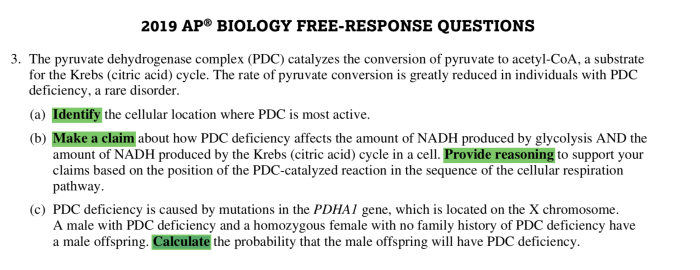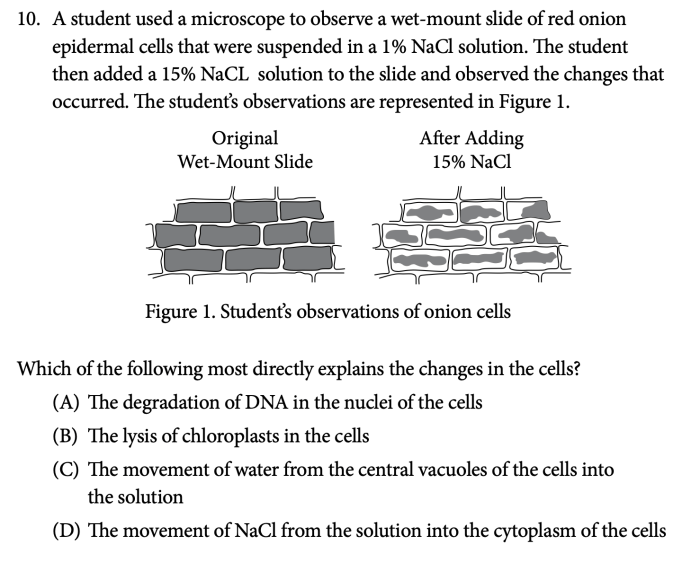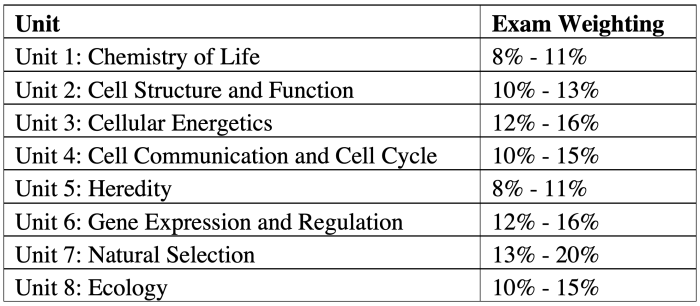Ap bio unit 4 test answers – Prepare for success in AP Bio Unit 4 with our comprehensive guide featuring expert answers and proven strategies. Dive into the key concepts, practice with sample questions, and learn effective study techniques to conquer the exam.
AP Bio Unit 4 Test Overview

The AP Bio Unit 4 Test is designed to evaluate students’ understanding of the principles of evolution, including natural selection, genetic drift, and speciation. The test is divided into two sections: a multiple-choice section and a free-response section. The multiple-choice section consists of 60 questions worth 50% of the total score.
If you’re seeking guidance on AP Bio Unit 4, look no further! Check out the comprehensive A Gathering of Old Men PDF for insights and expert perspectives. Return to the AP Bio Unit 4 test answers page for further practice and preparation.
The free-response section consists of two essay questions worth 50% of the total score.Preparing for the AP Bio Unit 4 Test is essential for success. Students who prepare for the test are more likely to score higher and earn college credit.
There are many different ways to prepare for the test, including studying the course material, taking practice tests, and attending review sessions.
Importance of Preparing for the Test
There are many benefits to preparing for the AP Bio Unit 4 Test. Preparing for the test can help students:
- Review and reinforce the course material.
- Identify areas where they need additional support.
- Develop test-taking strategies.
- Increase their confidence on test day.
Key Concepts and Topics: Ap Bio Unit 4 Test Answers
AP Bio Unit 4 delves into the intricacies of evolution, the mechanisms driving genetic variation, and the processes shaping the diversity of life on Earth. Key concepts and topics covered in this unit include:
Natural Selection
- Definition: A process by which organisms with advantageous traits have a higher chance of survival and reproduction, passing on their genes to subsequent generations.
- Mechanism: Variation within a population, differential survival and reproduction, and inheritance of advantageous traits.
- Evidence: Fossil record, comparative anatomy, molecular biology, and observed changes in populations over time.
Mechanisms of Evolution
Processes that introduce genetic variation into populations, including:
- Mutation: Changes in DNA sequence that can create new alleles.
- Genetic recombination: Exchange of genetic material during sexual reproduction.
- Gene flow: Movement of alleles between populations.
- Genetic drift: Random changes in allele frequencies due to chance events.
Speciation
The formation of new and distinct species through processes that prevent gene flow between populations:
- Allopatric speciation: Geographic isolation of populations.
- Sympatric speciation: Speciation within the same geographic area.
- Adaptive radiation: Diversification of species from a common ancestor into diverse ecological niches.
Evolutionary History of Life, Ap bio unit 4 test answers
The chronological sequence of events that have shaped the diversity of life on Earth, including:
- Origin of life: Theories and evidence for the emergence of life from non-living matter.
- Major evolutionary events: Key transitions in the history of life, such as the origin of eukaryotes and the Cambrian explosion.
- Extinction and mass extinctions: Processes that lead to the disappearance of species and their potential causes.
Applications of Evolutionary Principles
Practical applications of evolutionary biology in fields such as:
- Medicine: Understanding the genetic basis of diseases and developing new treatments.
- Agriculture: Improving crop yields and livestock production through selective breeding.
- Conservation: Identifying and protecting endangered species and their habitats.
Practice Questions and Sample Answers

To reinforce your understanding of AP Bio Unit 4 concepts, let’s delve into some practice questions with sample answers.
Cellular Processes and Energy
| Question | Answer |
|---|---|
| Describe the role of ATP in cellular processes. | ATP is the primary energy currency of cells, providing the energy for various processes, including muscle contraction, protein synthesis, and active transport. |
| Explain the difference between aerobic and anaerobic respiration. | Aerobic respiration requires oxygen and produces ATP, carbon dioxide, and water, while anaerobic respiration does not require oxygen and produces ATP, lactic acid, or alcohol. |
Molecular Genetics
| Question | Answer |
|---|---|
| Define a gene and describe its structure. | A gene is a segment of DNA that contains the instructions for a specific protein. It consists of a promoter, coding region, and terminator. |
| Explain the process of transcription and its significance. | Transcription is the process of copying a gene’s DNA sequence into a complementary RNA molecule, creating a messenger RNA (mRNA) that carries the genetic information to the ribosome for protein synthesis. |
Evolution
| Question | Answer |
|---|---|
| Describe the four mechanisms of natural selection. | The four mechanisms of natural selection are: directional selection, stabilizing selection, disruptive selection, and balancing selection. |
| Explain the role of genetic drift in evolution. | Genetic drift is a random change in allele frequencies within a population, which can lead to the loss or fixation of alleles, particularly in small populations. |
Study Strategies and Resources

Preparing for the AP Bio Unit 4 Test requires effective study strategies and access to helpful resources.Implementing active recall techniques, such as flashcards or self-quizzing, enhances memory retention. Create concept maps or diagrams to visualize complex processes and interconnections. Regular review and spaced repetition of the material strengthen understanding.
Recommended Resources
* Textbooks:Campbell Biology, Essential Biology with Physiology, Biology: Science for Life
Websites
Khan Academy, Bozeman Science, Crash Course Biology
Online Courses
AP Biology Course on edX, AP Biology Live Review on YouTube
Study Groups and Tutors
Joining study groups or working with a tutor offers valuable benefits. Group discussions foster collaboration, clarify concepts, and expose diverse perspectives. Tutors provide personalized guidance, address specific challenges, and supplement classroom learning.
Test-Taking Tips and Strategies

To maximize your performance on the AP Bio Unit 4 Test, implementing effective test-taking strategies is crucial. Here are some practical tips to help you manage time, tackle different question types, and stay calm under pressure.
Time Management
Time management is essential for completing the exam within the allotted time. Before starting, familiarize yourself with the test structure and time limits for each section. Allocate time wisely, spending more on complex questions and less on straightforward ones. Use the remaining time to review your answers and ensure you’ve attempted all questions.
Question Types
The AP Bio Unit 4 Test features various question types, including multiple-choice, free-response, and data analysis. For multiple-choice questions, eliminate incorrect answers to increase your chances of choosing the right one. For free-response questions, organize your thoughts before writing, using clear and concise language.
For data analysis questions, carefully interpret the data and support your conclusions with evidence.
Stress Management
Test anxiety can affect your performance. To manage stress, practice relaxation techniques such as deep breathing exercises or meditation. Stay positive and remind yourself that you’ve prepared thoroughly. If you encounter a difficult question, don’t panic; skip it and return to it later.
Remember, the goal is to demonstrate your understanding, not to answer every question perfectly.
FAQ Resource
When is the AP Bio Unit 4 exam?
Check the College Board website for the most up-to-date exam schedule.
How long is the AP Bio Unit 4 exam?
The exam is typically 90 minutes long.
What topics are covered on the AP Bio Unit 4 exam?
The exam covers topics such as evolution, ecology, and behavior.